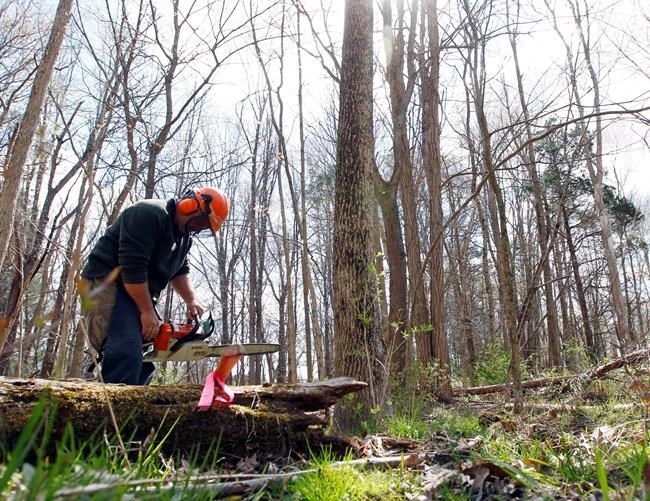
Jeff Rider of the New York State Department of Environmental Conservation prepares to cut down an ash tree to check for signs of emerald ash borer infestation in Rhinebeck, N.Y., on April 12, 2012. As many Canadians head out to enjoy nature this summer, a conservation group is encouraging them not to take invasive species with them. The Nature Conservancy of Canada says activities such as camping, hiking, biking, fishing, boating, horseback riding and driving ATVs can unintentionally spread invasive species into rivers, streams and forests. The emerald ash borer beetle is spread by moving firewood, the spotted knapweed plant can be spread through hiking and camping, and the Eurasian milfoil is spread by boating.
Image Credit: THE CANADIAN PRESS/AP, Mike Groll
August 04, 2018 - 9:30 AM
TORONTO - As many Canadians head out to enjoy nature this summer, a conservation group is encouraging them not to take invasive species with them.
The Nature Conservancy of Canada says activities such as camping, hiking, biking, fishing, boating, horseback riding and driving ATVs can unintentionally spread invasive species into rivers, streams and forests.
The group has released a list of the top 10 invasive species spread through summer recreational activities.
Conservation biologist Dan Kraus says the list contains some familiar species and others that may be surprising — such as cats, which can kill birds and other wildlife of conservation concern.
The emerald ash borer beetle is spread by moving firewood, the spotted knapweed plant can be spread through hiking and camping, and the Eurasian milfoil is spread by boating.
Kraus says many invasive species have few natural predators to control them.
He says once they get into ecosystems, they're often able to spread and out-compete native plants and animals for space, water, food and other resources.
"People may unknowingly be contributing to the spread of invasive species when they are enjoying the outdoors through their recreational activities," Kraus said. "That's why it's important to share information so that people can minimize the spread of invasive species to new areas in Canada."
The Nature Conservancy of Canada is the country's leading not-for-profit, private land conservation organization.
Since 1962, the NCC and its partners have helped to protect more than 1.1 million hectares across the country.
News from © The Canadian Press, 2018